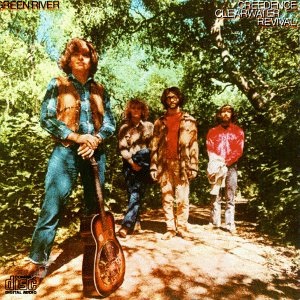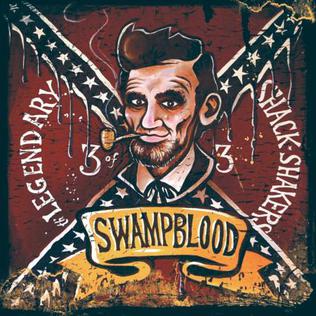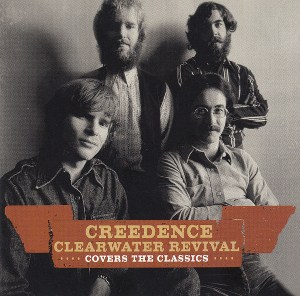This article needs additional citations for verification .(May 2014) |
This is a list of musicians who have played rockabilly. For a list of psychobilly musicians, see list of psychobilly bands.
This article needs additional citations for verification .(May 2014) |
This is a list of musicians who have played rockabilly. For a list of psychobilly musicians, see list of psychobilly bands.

The Legendary Shack Shakers are an American rock band from Murray, Kentucky that was formed in 1995 by J.D. Wilkes. The original line-up formed the band out of a shared interest in rockabilly, blues and Western swing. Subsequently, the band gained prominence in the alternative country scene with a sound that encompassed rockabilly, blues, country and punk rock and a lyrical focus on Southern Gothic themes. Over time, the band's sound shifted to emphasize country music.

Cosmo's Factory is the fifth studio album by American rock band Creedence Clearwater Revival, released by Fantasy Records on July 8, 1970. Six of the album's eleven tracks were released as singles in 1970, and all of them charted in the top 5 of the Billboard Hot 100. The album spent nine consecutive weeks in the number one position on the Billboard 200 chart and was certified 4x platinum by the Recording Industry Association of America (RIAA) in 1990. Rolling Stone ranked it number 413 on its 2020 list of the "500 Greatest Albums of All Time".

Creedence Clearwater Revival is the debut studio album by American rock band Creedence Clearwater Revival, released in July 1968, by Fantasy Records in the US. Featuring the band's first hit single, "Susie Q", which reached number 11 in the US charts, it was recorded shortly after the band changed its name from the Golliwogs and began developing a signature swamp rock sound.

Green River is the third studio album by American rock band Creedence Clearwater Revival, released on August 7, 1969 by Fantasy Records. It was the second of three albums they released in that year, preceded by Bayou Country in January and followed by Willy and the Poor Boys in November.
Swamp rock is a genre of rock music that originated in the mid-1960s as a fusion of rockabilly and soul music with swamp blues, country music and funk. The genre originated in Louisiana by artists such as Tony Joe White, but was subsequently popularized by California band Creedence Clearwater Revival.

Chronicle, or fully Chronicle: The 20 Greatest Hits, is a greatest hits album by the American rock band Creedence Clearwater Revival. It was released in January 1976 by Fantasy Records. The edited version of "I Heard It Through the Grapevine" featured on the album was simultaneously released as a single.
"Susie Q" is a rockabilly song co-written and performed by American musician Dale Hawkins released in 1957. The song was a commercial success, and became a classic of the early rock and roll era being recorded by many other performers in subsequent years.

Believe is the fourth studio album by American rock band Legendary Shack Shakers, released in 2004. This album, along with Pandelirium (2006) and Swampblood (2007), form a trilogy of albums referred to as the "Tentshow Trilogy" by the band.

Cockadoodledon't is the third studio album by American rock band Legendary Shack Shakers. Released on April 22, 2003, the album established the band's presence on the alternative country scene.

Swampblood is the sixth studio album by American rock band Legendary Shack Shakers. It is the third and final entry in the band's "Tentshow Trilogy" of albums, after Believe (2004) and Pandelirium (2006).

"Green River" is a song by American rock band Creedence Clearwater Revival. It was written by John Fogerty and released as a single in July 1969, one month before the album of the same name was released. "Green River" peaked at number two for one week, behind "Sugar, Sugar" by The Archies, and was ranked by Billboard as the No. 31 song of 1969.

Johnny Burnette and the Rock 'n Roll Trio is the 1956 debut album of the rockabilly band The Rock and Roll Trio, fronted by Johnny Burnette. Recorded over three separate sessions in 1956, the album includes a number of the band's singles. 2008's Icons of Rock calls the album "an all-time rockabilly classic". Released as a 10" LP in the UK by Vogue/Coral Records in December 1956 (#10041), it was released again in 12" format in its US debut by Coral Records in 1957 (#57080) and in 1978 by Solid Smoke (#8001). A few years previously, there had also been an unauthorized reissue of the album which featured an exact reproduction of the cover and label, although differences in label and cover formatting noted by collectors reveal it as a reprint. In 1993, it was released on compact disc by Aris Records. 1998's Go Cat Go!: Rockabilly Music and Its Makers characterizes the CD reissue as "legendary and essential."
"Lonesome Tears in My Eyes" is a song written by Johnny Burnette, Dorsey Burnette, Paul Burlison and Al Mortimer. It was first released by co-writer Johnny Burnette and his Rock 'n' Roll Trio in December 1956, and has been covered by various artists, including the Beatles.

Creedence Clearwater Revival Covers the Classics is a compilation album by American rock band Creedence Clearwater Revival. Released in 2009, the album contains cover versions of songs as recorded by the band.

"Almost Saturday Night" is a song written by John Fogerty and first released on his 1975 album John Fogerty. It was released as a single and reached No. 78. It has been covered by a number of artists, including Dave Edmunds, who also released it as a single to more success, Gene Clark, Ricky Nelson, The Searchers, The Georgia Satellites and Ned LeDoux.
"Ramble Tamble" is a song written by John Fogerty and recorded by Creedence Clearwater Revival. It was released as the opening track on the band's fifth studio album, Cosmo's Factory, in 1970. It is known for its lengthy instrumental section and tempo changes.
"Don't Look Now " is a song written by John Fogerty that was first released on Creedence Clearwater Revival's 1969 album Willy and the Poor Boys. It has also appeared on several of the group's live and compilation albums. It was covered by Minutemen on their 1984 album Double Nickels on the Dime.
"Keep On Chooglin'" is a song written by John Fogerty that was first released as the final song on Creedence Clearwater Revival's 1969 album Bayou Country. The song was often used to close Creedence Clearwater Revival concerts and was later covered by several other artists including Fogerty as a solo artist. The song popularized the neologism "chooglin'."
Williams returned the welcome with an inspired set of country-style rock 'n' roll at its best. [...] a full-speed-ahead set of no-holds-barred rock, blues-rock, and rockabilly rock so intense that Williams himself was forced to partially disrobe near the end of the show.